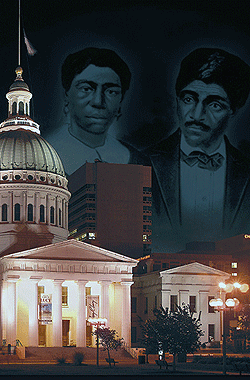To commemorate the sesquicentennial of the infamous U.S. Supreme Court decision, the University is hosting a national symposium on “The Dred Scott Case and Its Legacy: Race, Law and the Struggle for Equality” March 1-3.
The symposium examines the impact and legacy of the case and brings to campus nationally renowned historians, legal scholars and judges; a Scott descendant; and rare documents pertaining to the case in Missouri, where the 11-year legal battle began.

In 1846, slaves Dred Scott and his wife, Harriet, filed suit for their freedom in the St. Louis County Circuit Court. After more than a decade of reversals and appeals, the case reached the Supreme Court.
That court’s landmark decision, issued in 1857, upheld a Missouri appellate court ruling that denied the Scotts their freedom. The Supreme Court decision declared that blacks were not citizens and, therefore, could not sue in federal court. Further, the court ruled that the federal government did not have the power to prohibit slavery in its territories. The decision contributed to rising tensions between the North and South just before the Civil War.
“Although a bloody Civil War produced three Constitutional amendments to reverse that decision, the achievement of full racial, religious and ethnic equality in this country remains an unfinished project,” said David T. Konig, Ph.D., a symposium organizer, professor of law and director of the Legal Studies Program in the School of Law, and professor of history and of African & African American Studies, both in Arts & Sciences.
“This symposium will ask why and how this is so 150 years later and how it might be changed,” he added. “It seeks to study and resume the struggle that the Scotts began in St. Louis and to be the focal point for reflection and recommitment to racial equality.”
The symposium, which is free and open to the public, opens with a keynote address by Chief Justice Michael A. Wolff of the Supreme Court of Missouri at 4 p.m. March 1 in Graham Chapel. Wolff will discuss “Race, Law and the Struggle for Equality: Missouri Law, Politics and the Dred Scott Case.” (See story above.)
Panel discussions from 8:30 a.m.-4:30 p.m. March 2-3 in the Bryan Cave Moot Courtroom of Anheuser-Busch Hall will examine the case and its legacy from the Civil War to the present.
Panel moderators include leading scholars on race and the law. Among the panelists is Jack Greenberg, a Columbia Law School professor who argued for the NAACP before the Supreme Court in the 1954 Brown v. Board of Education case, which declared “separate but equal” unconstitutional.
Lynne Madison Jackson, the great-great-granddaughter of Dred and Harriet Scott, also will participate in the symposium.
March 3 features a session devoted to the theme of “From Scholarship to Citizenship,” with St. Louis public school teachers interacting with panelists on how scholarship can be integrated into school curricula.
Following that session, a judicial roundtable — featuring Wolff and others from the Supreme Court of Missouri — takes up the issues raised by the case and the lessons to be learned about the entry of politics into the judicial process.
The symposium concludes with a reception from 4:30-5:30 p.m. March 3 at Olin Library, where documents from the Dred Scott case collection of the Missouri State Archives will be on display. The exhibition includes the original petition to sue for freedom filed by Dred Scott April 6, 1846, in the St. Louis County Circuit Court.
For speaker information, to register and for a list of symposium sponsors including Arts & Sciences and the School of Law among others, visit law.wustl.edu or artsci.wustl.edu/~acsp/dred.scott.